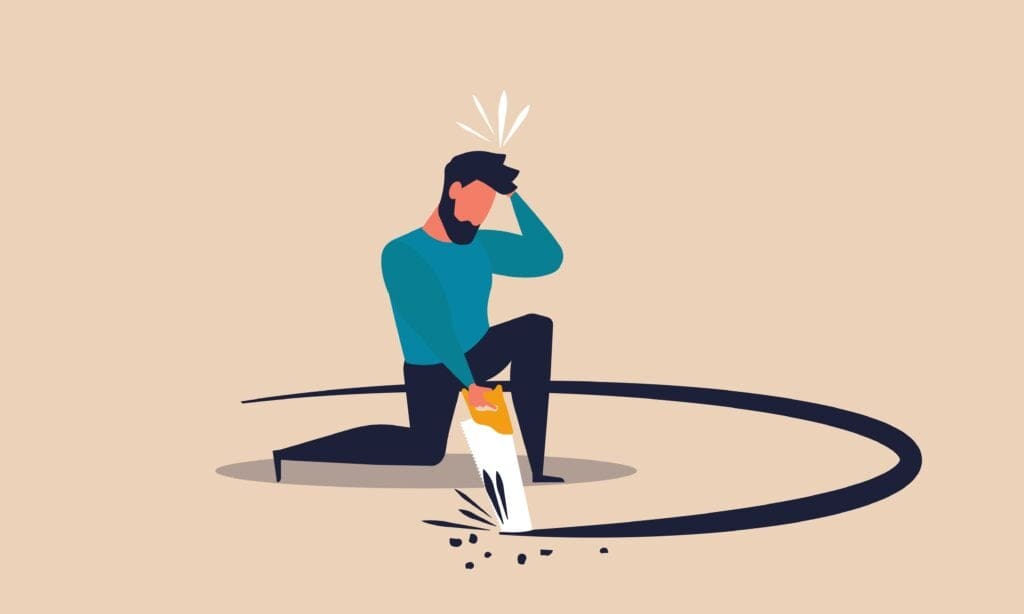Self-sabotage can be one of the most challenging patterns to confront, especially for individuals struggling with mental health issues or addiction. This self-defeating behavior, which can manifest as procrastination, substance abuse, or even consciously undermining one’s goals, often stems from deep-seated beliefs and emotions. If you find yourself asking, “Why do I keep holding myself back?” or see this pattern in a loved one, you’re not alone.
Here, we’ll explore why people self-sabotage, how it ties into mental health and substance abuse, and—most importantly—ways to overcome it.
1. Fear of Failure (or Success)
Self-sabotage often arises from a fear of failing or, ironically, succeeding. Success can bring about new responsibilities, challenges, and even changes in personal relationships. For some, these unknowns trigger feelings of inadequacy or anxiety, leading them to avoid taking steps toward their goals. On the other hand, fear of failure can make people undermine their efforts as a form of self-protection: if they never fully try, they’ll never truly fail.
2. Low Self-Worth
People who feel unworthy of happiness or success may unconsciously set themselves up for failure. This is often linked to unresolved trauma, negative childhood experiences, or persistent feelings of inadequacy. They may feel that they don’t deserve a fulfilling life or the rewards that come with positive choices, so they self-sabotage to align their actions with this belief. This cycle can be even more entrenched for individuals struggling with addiction, who may feel that past mistakes define them.
3. Unresolved Trauma and Emotional Pain
Trauma, whether from childhood or later life experiences, can create cycles of self-destructive behavior. Individuals who have experienced trauma may resort to self-sabotage as a coping mechanism, especially if they haven’t addressed the root causes of their pain. For some, substance abuse or risky behaviors are a way to numb emotions or distract themselves from painful memories, creating a temporary escape but perpetuating the cycle of harm.
4. Perfectionism
Perfectionism is a double-edged sword that can lead people into a cycle of self-sabotage. Perfectionists often have unrealistically high standards, which, when unmet, result in feelings of inadequacy and frustration. Rather than risk not being “perfect,” they may procrastinate or abandon tasks entirely. This mindset can make recovery from addiction and mental health challenges feel overwhelming, especially if someone believes they must make a perfect recovery without mistakes.
5. Comfort in Familiar Patterns
For many, self-sabotage is simply what they know. Familiar habits and thought patterns, even negative ones, offer a sense of control. The cycle of substance abuse, for example, can feel oddly “safe” for someone who has relied on it for years to cope with stress or trauma, even if it keeps them from thriving.
Breaking the Cycle of Self-Sabotage
1.Identify the Triggers: Start by observing when and why you feel the urge to self-sabotage. Keep a journal or talk with a therapist to uncover the situations, thoughts, and feelings that lead to self-defeating actions.
2.Challenge Negative Beliefs: Recognize that beliefs about worthiness or failure are often rooted in the past and don’t reflect your current reality. Cognitive Behavioral Therapy (CBT) and other therapeutic approaches can help reframe these thoughts.
3.Practice Self-Compassion: Healing from self-sabotage requires patience and kindness. Remind yourself that setbacks are part of growth. If you struggle with addiction, every step toward recovery, no matter how small, is progress.
4.Establish Realistic Goals: Setting small, achievable goals can help build confidence and create a foundation for bigger successes. Celebrate each milestone rather than waiting for “perfection.”
5.Seek Support: Recovery from self-sabotaging behaviors is often difficult to do alone. Therapy, support groups, and treatment programs can provide the guidance, accountability, and encouragement needed to make lasting change.
Moving Toward Self-Acceptance and Growth
Breaking the cycle of self-sabotage is a journey, one that requires courage and persistence. At our center, we understand that overcoming self-defeating behaviors is essential to building a life that’s rich, fulfilling, and free from the chains of past pain. By addressing these patterns through compassionate, evidence-based treatment, individuals can rediscover their strengths and move forward with renewed hope.
If you or someone you love is struggling with self-sabotage, whether through addiction or mental health challenges, know that help is available. Taking the first step can feel difficult, but it’s the beginning of a path toward self-acceptance, resilience, and a brighter future.



